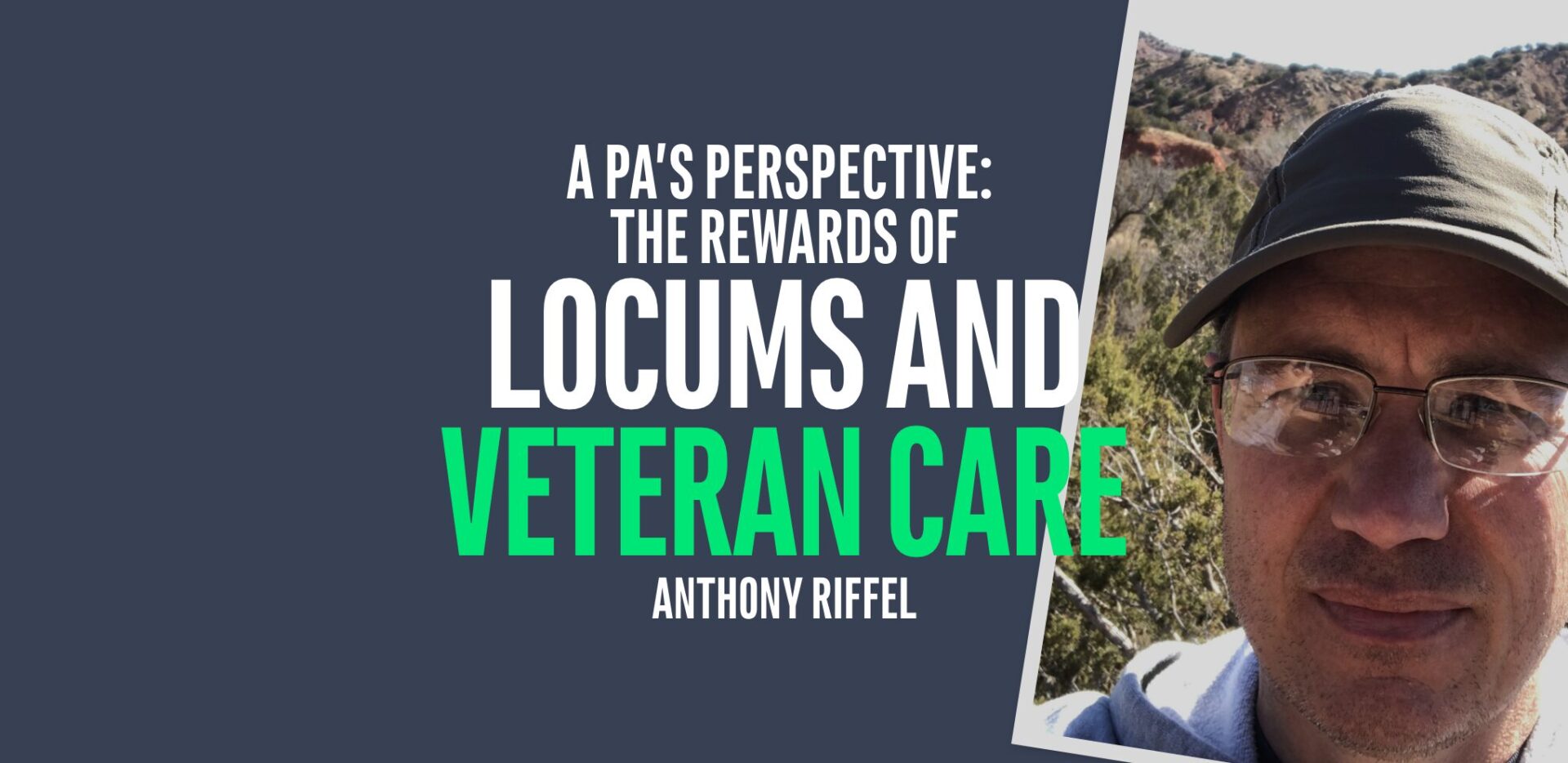Anthony Riffel’s journey as a physician assistant is a testament to how adaptability and dedication can shape a meaningful career. From his time as an army medic to his specialization in cardiothoracic surgery, Anthony has consistently embraced opportunities that align with both his expertise and his desire to make an impact.
By integrating locum tenens work into his practice, he’s been able to continue serving in veteran care and emergency medicine, all while enjoying the flexibility that supports both his professional growth and personal well-being.
In this interview, Anthony offers insights into how he balances these roles, showing that physician assistants can build specialized, rewarding careers while capitalizing on the flexibility that locum tenens work provides.
Can you share about what led you to become a physician assistant and what drew you to medicine in general?
I’ve wanted to be in medicine for as long as I can remember. When I was growing up, my favorite TV shown was Emergency, about EMTs out in the field, and that’s what I wanted to be.
After high school, I ended up joining the army, and I became a medic. That was my first step into medicine. As a medic, I was exposed to physician assistants. [After getting out], I used my Army money to go to college, and was lucky enough to get into PA school on that pathway.
What led you to choose cardiothoracic as a specialty?
Surgery has always fascinated me. I got a VA scholarship that paid for PA school, and part of the requirements of that scholarship was that I had to work two years at the VA.
When I applied to surgical jobs within the VA nationwide, I was lucky enough to be hired in cardiothoracic surgery as my very first job, and I’m still at my very first job, 27 years later.
What made you decide to continue working at the VA?
I love this patient population. It’s nice to have a camaraderie with them, being a veteran myself, so I know a little bit about what they’re coming from.
When I graduated and started working at the VA, my plan was to stay for a couple of years, pay off my scholarship, and then transition to a private practice where I could earn a higher salary. But I didn’t, because I love this job. I didn’t want to leave the VA. I didn’t want to leave the population. I could have made more money, but I would have sacrificed that with a worse lifestyle and more stress. So for me, this was definitely the best fit.
After having the same job for so many years, what made you decide to try locums?
I’ve been moonlighting in the ER for most of my career. I also had a colleague that worked with me at the VA that moved on to doing locum tenens. Because of my full-time job, I was looking for work that would allow me to work on weekends, or for one week at a time instead of longer, three-month shifts. When I found my first locums job, it worked out ideally for my schedule and [the hospital’s] schedule too. And it was here in Texas, so I didn’t have to worry about out of state credentialing.
Do you enjoy being able to do something different in your locums job?
I do! Because I’ve been at the VA for my whole surgical career, I’d never operated in another hospital. So it was stressful, but stressful in a good way, to go to someplace new and learn how they do things.
Fortunately for me, the staff at my locums job was very welcoming and patient as I learned their routines, and I did my best to blend in. I’m not someone that’s going to come into a new environment and say, No, I want to do it this way, because this is how I do it. This is their house. I’m the guest, so I adapt to them.
What have been the benefits of locum tenens for you?
It’s very flexible, and it pays really well. I can’t imagine anything else that would pay the amount of money that locums does for the amount of time it takes, especially when it comes to short stints. It has worked out really well for me to be able to continue in my regular job, while taking some time off to be able to do locums as well.
There’s a lot of conversations right now about the Physician Assistant title transitioning to Physician Associate. Do you feel strongly about the title?
Since my first day of being a PA student, they’ve been talking about changing the name of physician assistant, but I’ve never really put that much thought into it. This is who I am, this is the profession. I think a physician associate is more accurate, but I wouldn’t mind if I stayed a physician assistant for my whole career.
You’ve been a PA for more than two decades. Have you seen a shift in the perception of the role?
It’s a more respected profession. We’re everywhere now. It’s rare that you meet someone that hasn’t seen a physician assistant or doesn’t know what one is. I get a lot of patients that have their PA as their primary care saying, Oh, I love my PA, they listen to me. So I think that’s a big role that we play as PAs.
What advice do you have for other PAs considering locums?
Save everything when you’re credentialing, because you’re going to be asked for those documents down the road if you go to a different hospital. It’s a good idea to try to keep everything all in one place, so that when you get asked for them again, it’s easy to access and you don’t have to reinvent the wheel.
Hayes Locums has been really great to work with. They were great in getting the credentialing done, and I don’t have anything negative to say about the process. The travel was easy, the lodging was easy. Everything was taken care of through and through.
Locums is a great opportunity if you want something that allows flexibility to work when you want to work, and to not work when you don’t want to work. You can use it for supplemental income, or as a plan for retirement. That’s what I hope to do when I retire, is take on those three month assignments, where you can make a lot of money for a fairly short amount of time. That’s the benefit of locums: you get the choice of when you do and don’t want to work.



